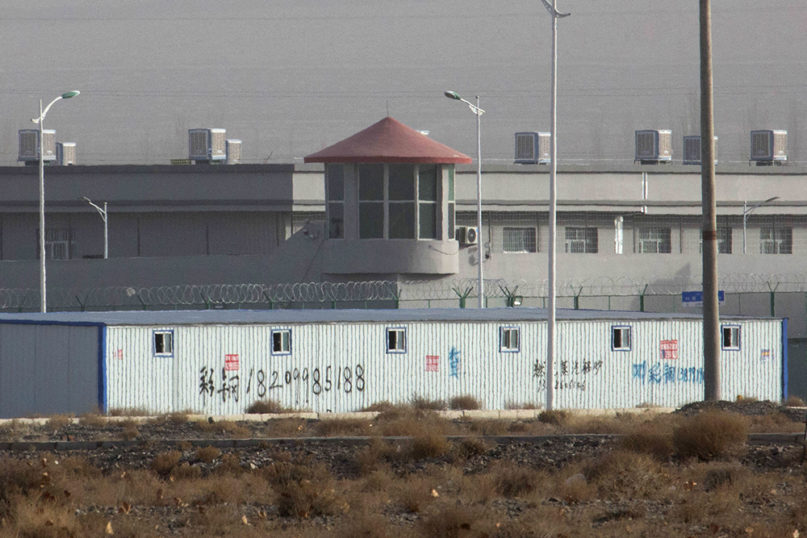(RNS) — President Donald Trump has signed into law legislation calling for sanctions against Chinese officials responsible for detention camps holding more than 1 million members of the country’s Uighur Muslim minority.
“Uyghurs around the world are celebrating,” said Omer Kanat, executive director of the Uyghur Human Rights Project, in a statement. “It’s the kind of news we have been waiting for, more than three years into the Uyghur crisis.”
The bipartisan Uyghur Human Rights Policy Act of 2020 passed overwhelmingly by both the House and Senate in May. It calls for sanctions against Xinjiang Communist Party Secretary Chen Quanguo and other Chinese officials over the camps.
The law’s signing comes amid explosive allegations in a new book by former national security adviser John Bolton that Trump told Chinese President Xi Jinping to continue building the prisonlike camps.
Human rights advocates and Trump administration officials alike have roundly condemned the camps.
Last year, Vice President Mike Pence denounced the “around-the-clock brainwashing” Uighurs face within the camps. Reports indicate that China has weaponized surveillance, arbitrary detentions, forced labor, torture, DNA collection and even organ harvesting again the minority group.
China has claimed the camps are “vocational centers” aimed at countering Islamic terrorism and Uighur separatism. The country’s Communist Party, which initially denied the existence of the camps, has repudiated any allegations of abuse against Uighurs. The party has warned of retaliation “in proportion” if sanctions targeted Chinese officials.
An excerpt from Bolton’s forthcoming book, “The Room Where It Happened: A White House Memoir,” published in The Wall Street Journal includes a claim that Trump supported the camps during a conversation with Xi, attended only by translators, last year at a G-20 meeting in Japan.
“According to our interpreter, Trump said that Xi should go ahead with building the camps, which Trump thought was exactly the right thing to do,” Bolton wrote. The former Trump aide noted that another National Security Council official said the president made similar comments during a 2017 trip to China.
Trump has said that allegations made in the book are false, tweeting, “Many of the ridiculous statements he attributes to me were never made, pure fiction.”
Nihad Awad, head of the Council on American-Islamic Relations, said it was ironic that the claim emerged the same day as Trump signed the bill into law. He also called on Congress to look into the allegations.
“We condemn President Trump’s reported approval of China’s concentration camps — places of untold suffering, torture, abuse, rape, and death — for Uyghur Muslims,” Awad said. “Congress must immediately investigate whether Trump gave his blessing to round up, imprison and oppress an ethnic religious community in concentration camps.”
Trump made his first public comment on the camps in July 2019 as he met with Jewher Ilham, daughter of imprisoned scholar Ilham Tohti, and other victims of global religious persecution during the Ministerial to Advance Religious Freedom.
“That’s tough stuff,” said Trump as Ilham described her father’s ongoing imprisonment. He also appeared not to know in which region of China the camps were located.
Sen. Marco Rubio, who first introduced the bipartisan bill in 2018 with Sen. Bob Menendez, said in a statement that the passage of the legislation was an “important step” in countering China’s “widespread” human rights abuses.
“ … President Trump took a historic step in support of Uyghur Muslims worldwide and against China’s egregious human rights abuses and probable crimes against humanity,” Rubio said. “As the Chinese government and Communist Party continues its mass internment of at least a million Uyghurs and other Muslim ethnic minorities, the United States will hold the CCP and its enablers accountable for their heinous crimes.”
The Washington-based Campaign for Uyghurs called the signing “a remarkable occasion because of what this moment represents for an entire race of people who have been unimaginably oppressed.”
Erkin Sidick, a Uighur optical engineer who works for NASA, called it a “historic event that the Uyghurs and the Uyghur nation will remember forever.”
Uighur activists are also urging Congress to pass the bipartisan Uyghur Forced Labor Prevention Act, which would sanction officials and companies responsible for Uighur forced labor and require importers to prove that goods from Xinjiang were produced without forced labor.





